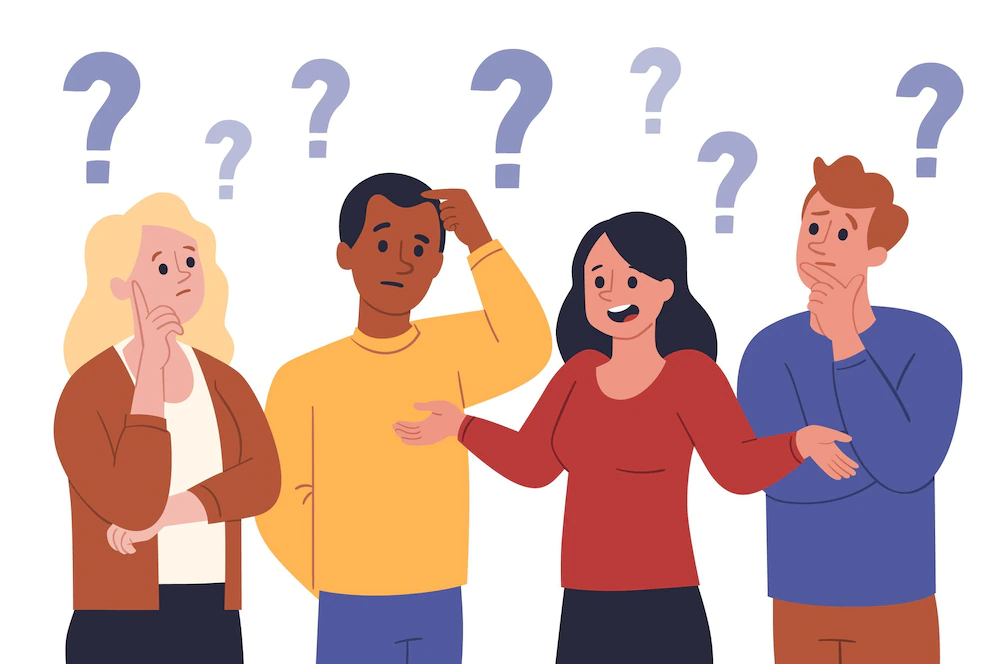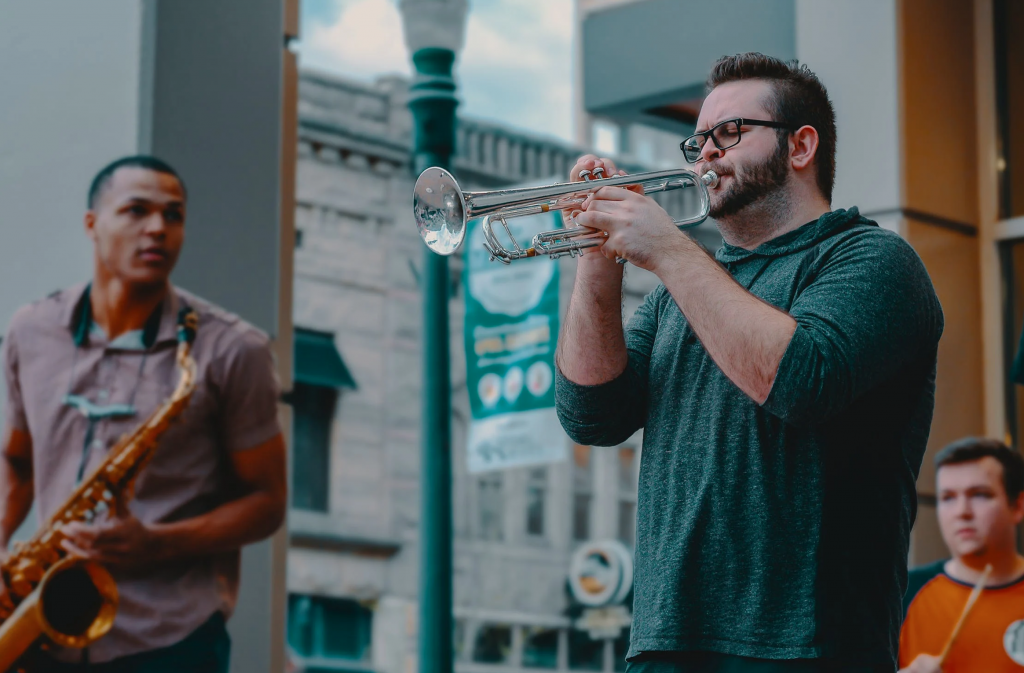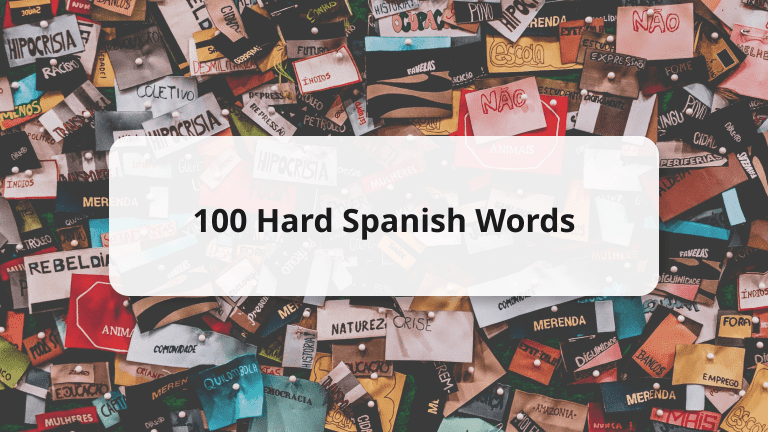There are some hard Spanish words that could prove to be difficult for a beginner Spanish speaker!
In the Spanish language, besides knowing the Spanish alphabet or basic Spanish words, it is also important to be aware of words that are hard to pronounce or understand. Adding these hard Spanish words to your vocabulary will not only spice up your everyday conversations but make you a better speaker in general!
In this article, we will be teaching you the meaning and how to pronounce 100 of the hardest Spanish words to learn, along with some fun Spanish tongue twisters!
10 Hardest Words in Spanish
We will first be discussing 10 of the hardest words in the Spanish language.
These are very hard-to-pronounce words and look like they belong in some Harry Potter spell book! If you get the hang of these, you will really sound like a pro in conversational Spanish.
1. Otorrinolaringólogo
Auto-reno-lah-ring-go-logo
It means otolaryngologist and is a medical specialty, which is someone who studies diseases related to the mouth and throat.
2. Espantapájaros
Is-pun-tah-pah-ja-ross
Meaning scarecrow, a clothed humanoid-shaped decoy or mannequin used to scare off birds from crops in large fields. A scary mannequin for an equally scary-looking word!
3. Electrodoméstico
Electro-dough-mess-tea-co
A hard Spanish word that means “Electrical appliance”, which is an object that uses electricity to do a certain function, such as a toaster or a night light.
4. Ferrocarril
Feh-row-cah-r-ee-l
So many r’s! The word means “railway” which is a steel track that trains move on. Both of the double r’s are rolled with your tongue.
5. Desarolladores
Deh-sah-roll-adore-is
A word that means “developers”. The word contains hard r’s and a “D” that is pronounced similar to the “th” in “They” in English.
6. Caleidoscopio
Caw-lay-dough-scope-yo
A word that looks similar to its English counterpart, which is “Kaleidoscope” and bears the same meaning.
7. Impermeabilizante
Im (as in imperfect)-purr-mia-billy-san-tay
A hard Spanish word that just means “to waterproof” or “waterproofing”. The important thing to keep in mind when reading these words is to read them slowly and practice pronouncing each syllable!
8. Halagüeño
Ah-lah-when-yo
It means when something is flattering, like when you receive a lot of compliments from someone!
9. Anaranjada
Ah-nah-rah-ha-da
A hard Spanish word that simply means “Orange”. It should be noted that the “Ja” in Anaranjada is pronounced like “Ha” but the H is coupled with a growing sound, like when you push your tongue to the roof of your mouth and exhale.
10. Tejemaneje
Teh-heh-mah-neh-heh
A hard Spanish word that means “gossip”. The “eje” is pronounced as “Heh” coupled with the growling similar to the H in Anaranjada.

Common Pronunciation Problems
Vowel Sounds
Vowels (A, E, I, O, and U) are pronounced differently in English in Spanish. Unlike the English language, in Spanish, all five vowels are pronounced with one respective sound. A common mistake that English speakers make when trying to pronounce Spanish vowels is mispronouncing “e”, which is pronounced as “eh” or the same way as the “e” in “Fred”. For example, instead of pronouncing the name José as “Ho-seh”, English speakers pronounce it as “Hoe-zay”.
Double RR Sounds
In Spanish, there are two ways to pronounce the letter “r”, there is a single “r” and a double “rr”. Whenever a Spanish word contains the double “rr”, then the “r” needs to be pronounced harder. If you don’t pronounce the “r” correctly, then the meaning of the word can change entirely. For example, the word perro with double “rr” means “dog”, but the word pero with one “r” means “but”.
Double LL Sounds
Similar to “r” and double “rr” in Spanish, we have the same for a single “L” and a double “LL”. A single “L” is pronounced as “ele” and the double “LL” is, weirdly enough, pronounced as “Ya”. For example, if the English word “Llama” followed this Spanish rule, then it would be pronounced as “Yama”. The same goes for the English word “Llave”, which would be pronounced as “Yah-ve”.
Distinction Between “B” and “V”
The letters “b” and “v” are pronounced in a similar way in the Spanish language. If these letters are the first letter in a word, or after letters such as “m” or “n”, then “b” and “v” are pronounced the same way. For example, the words the word vamos is pronounced as bah-moss similar to the word bueno.
However, if “b” and “v” are in the middle of a word, then the pronunciation changes. For example, Levanta is pronounced as le-vhan-ta and Bolivia as bo-liv-ia, and sabemos is pronounced as sa-veh-moss.

90 of the Hardest Spanish Words to Learn
We will now be discussing other 90 difficult Spanish Spanish words. After learning some of these difficult Spanish words, up the ante by learning the adjectives in Spanish!
The “J” Sound
The “J” sound in Spanish sounds more like “H” with a slight exhaled growl noise, and the “R” is rolled when pronounced (Like when pirates say “Yarrrr”). All words including these letters follow this pattern unless stated otherwise.
Jaula
It means “Cage” and is pronounced as how-la.
Jardín
“Yard”, is pronounced as hah-r-dee-n.
Joyería
“Jewelry” and is pronounced as hoi-eh-reea.
Jarrón
“Vase”, pronounced as hah-rohn.
Pájaro
“Bird”, pronounced as pah-ha-row. Birds come in all types of colors, describe them more by learning how to say colors in Spanish!
Sonrojar
“Blush”, pronounced as sohn-roh-har.
Equipaje
“Luggage”, a rather difficult Spanish word to pronounce. In a nutshell it is pronounced as eh-key-pah-he.
Injusticia
“Injustice”, pronounced as in-who-stee-hya.
Jirafa
“Giraffe”, pronounced as he-rah-fah (F as in fight).
Lujoso
“Luxurious”, pronounced as loo-ho-so,
Jengibre
“Ginger”, pronounced as huh-he-breh.
Paisaje
“Scenery”, pronounced as pie-sa-heh.
Dibujo
“Drawing”, pronounced as dee-boh-ho.
Ojos
“Eyes” pronounced as oh-hos.
Jugoso
“Juicy”, pronounced as who-go-so.

The “G” Sound
Acogedor
“Cozy”, pronounced as ah-co-ge (as in get)-door
Agujero
“Hole”, pronounced as ah-goo-heh-roh.
Garaje
“Garage”, pronounced as gah-rah-heh.
Ginecólogo
“Gynecologist”. The “Gi”/”Gu” and “Ge” in these difficult Spanish words is pronounced as “Gee” and “Geh” respectively, both with a gurgling sound if at the front of a word. As such it is pronounced as geen-eh-co-low-go.
Girasol
“Sunflower”, pronounced as gee-rah-soul.
Genio
“Genius”, pronounced as geh-neo.
Guiso
“Stew”, pronounced as gee-sow.
Aguila
“Eagle”, pronounced as ah-gee(no gurgling sound)-lah.
Vergüenza
“Shame”, pronounced as vurr-gwen-zah. You know what is shameful? Not knowing the difference between ser vs estar! Luckily it’s pretty easy to get the hang of!
Geografía
“Geography”, pronounced as geh-oh-gra-fee-yah
Garabato
“Scribble”, pronounced as gah(no gurgle)-rah-bah-toe.
Paragua
“Umbrella”, pronounced as pah-rah-gwah.
Guitarra
“Guitar”, pronounced as gee(no gurgle)-tah-rah.
Portugués
”Portuguese”, pronounced as poor-toe-guess
Pinguino
“Penguin”, pronounced as ping-gwee-no.

The “RR” Sound
Arrugas
“Wrinkles”, pronounced as ah-rue-gahs.
Verruga
“Wart”, pronounced as veh-rue-gah.
Barranco
“Ravine”, pronounced as bah-wrung-co.
Burro
“Donkey”, pronounced as boo-row.
Terremoto
“Earthquake”, pronounced as teh-reh-mow-toe.
Tierra
“Earth”, pronounced as teh-ah-rah.
Borrador
“Eraser”, pronounced as bo(as in bowl)-rah-door.
Pelirrojo
“Redhead”, pronounced as peh-lee-ho-roh.
Susurro
“Whisper”, pronounced as sue-sue-roh.
Carrera
“Race”, pronounced as cah-reh-rah.
Barril
“Barrel”, pronounced as bah-reel.
Cerradura
“Lock”, pronounced as serah-do-rah.
Torre
“Tower”, pronounced as toh-reh.
Correcto
“Correct”, pronounced as co-rect-oh.
Arreglar
“Arrange”, ah-reh-glahr.

The “B/V” Sound
Vaquero
“Cowboy”, pronounced as bah-geh-row.
Violín
“Violin”, pronounced as bee-low-een.
Volante
“Steering wheel”, pronounced as bow-lawn-teh.
Biberón
“Feeding bottle”, pronounced as bee-beh-rohn.
Hierba
“Herb”, pronounced as ear-bah.
Tabla
“Table”, pronounced as tah-blah.
Blusa
“Blouse”, pronounced as blue-saw.
Tiburón
“Shark”, pronounced as tee-boo-rohn.
Abuelo
“Grandfather”, pronounced as ah-bweh-low.
Lluvia
“Rain”, pronounced as chew-bee-ah.
Lleva
“Carry”, pronounced as Jeh-wha.
Revelar
“To reveal”, pronounced as treh-veh-lar(as in lard).
Sabia
“Wise”, pronounced as saw-bee-ah.
Oveja
“Sheep”, oh-veh-ha.
Varón
“Male”, pronounced as veh-rohn.

The “TR” Sound
The “T” in Spanish is pronounced as “Tuh” instead of “Tea” in English.
Triángulo
“Triangle”, pronounced as tree-on-goo-low.
Postre
“Dessert”, pronounced as pohs-treh.
Trompo
“Spinning top”, pronounced as trohm-po.
Trigo
“Wheat”, pronounced as tree-go.
Nutria
“Otter”, nuw-tree-ah.
Trampolín
“Trampoline”, pronounced as trum-po-lean.
Cuatro
“Four”, pronounced as qua-tro(as in trove).
Trenzas
“Braids”, pronounced as tren(as in trend)-fas.
Monstruo
“Monster”, pronounced as mon-strow.
Tren
“Train”, pronounced as tr-eh-n.
Potro
“Foal”, pronounced as paw-trow(as in betrothed).
Avestruz
“Ostrich”, pronounced as ah-ves-truth.
Triste
“Sad”, pronounced a tr-ee-stay.
Truenos
“Thunders”, pronounced as true-eh-knows.
Trompeta
“Trumpet”, pronounced as trohm-peh-ta.

The “LL” Sound
Rodilla
“Knee”, pronounced as roh-dee-ya.
Pollo
“Chicken”, pronounced as poh-yoh.
Ballena
“Whale”, pronounced as ba-yeh-nah.
Llavero
“Key ring”, pronounced as cha-beh-roh.
Anillo
“Ring”, pronounced as ah-knee-yoh.
Estrella
“Star”, pronounced as es-treh-yah.
Galletas
“Cookies”, pronounced as gah-yeah-tah-s.
Servilleta
“Napkin”, pronounced as sir-we-yeah-tah.
Bellota
“Acorn”, pronounced as beh-yo-tah.
Llorar
“To cry”, pronounced as cho-rawr.
Tortilla
“Tortilla”, pronounced as tor-tea-ya and not like the English tor-tea-la.
Granadilla
“Passion Fruit”, pronounced as grah-nah-dee-ya.
Zorillo
“Skunk”, pronounced as soh-ree-yo.
Espinilla
“Shin”, pronounced as es-pee-knee-ya.
Camello
“Camel”, pronounced as cah-meh-yo.

Spanish Tongue Twisters
Tongue twisters are a really fun way to practice pronouncing these hard Spanish words, so it’s worth giving it a try! Below we have listed a few Spanish tongue twisters, see if you can get the hang of them!
¿Cómo quieres que te quiera si el que quiero no me quiere como quiero que me quiera?
The English translation would be “How do you want me to like you if the one I want to like me doesn’t like me as I want him to like me?”. It means that you are asking someone who likes you (or someone that wants you to like them) how you can like them if the person that you like, doesn’t like you back. Sheesh, sounds like the plot line of a telenovela. This phrase helps you understand how to pronounce the “qu” in Spanish.
¿Por qué a la cama se le llama cama y a la cómoda cómoda, si es más cómoda la cama que la cómoda?
It means “Why is the bed called a bed and the chest of drawers chest of drawers, if the bed is more comfortable than the chest of drawers?” Overall, it does not make a lot of sense in English, but It’s still something fun to try and say in Spanish!
Tres tristes tigres tragaban trigo en tres tristes trastos sentados tras un trigal.
A helpful tongue twister that helps you pronounce the “Tr” in Spanish. It means “Three sad tigers swallowed wheat in three sad utensils seated behind a wheatfield.” The jist of this phrase is about three sad tigers that swallowed wheat in a wheatfield. Most tongue twisters won’t really make sense when directly translated into English.
Pablito clavó un clavito en la calva de un clavito. Un clavito clavó Pablito en la calva de un calvito. ¿Qué clavito clavó Pablito?
A rather sinister tongue twister that helps you pronounce “cla”. It means “Pablito stuck a little nail into the bald head of a bald guy. A little nail stuck Pablito in the bald head of a bald guy. What little nail did Pablito nail?” So, the person Pablito stuck a nail onto the head of a bald man. I doubt this is legal, rather just stick to the phrase and not replicate the action. Ok? Ok.

Getting these words right will make you sound like a Spanish genius!
Once you have mastered pronouncing these hard Spanish words, learning the rest will be much easier and you will be one step further to becoming a bonafide Spanish speaker!
If you are still struggling, perhaps downloading or using a Spanish learning app will help you get up to speed. The best way to completely master a Spanish or language topic is by getting an online tutor, and at AmazingTalker, we have a variety of amazing tutors to help you reach your language fluency goals in no time! Choose from a variety of different courses, and customize it to fit your needs!
















